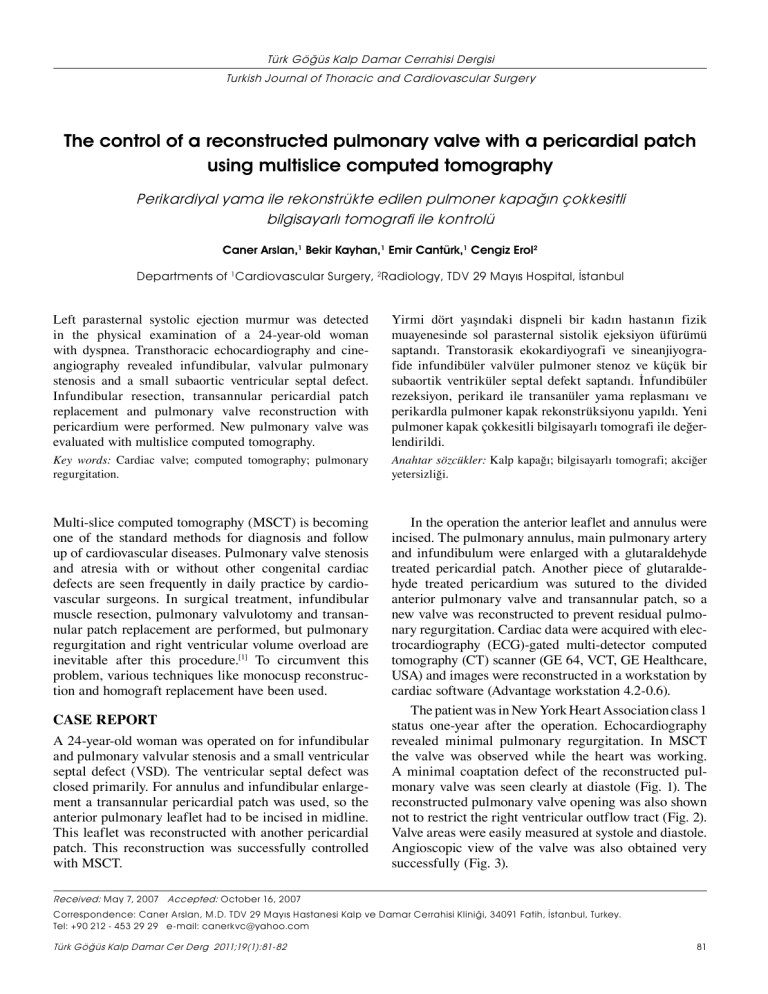
Türk Göğüs Kalp Damar Cerrahisi Dergisi
Turkish Journal of Thoracic and Cardiovascular Surgery
The control of a reconstructed pulmonary valve with a pericardial patch
using multislice computed tomography
Perikardiyal yama ile rekonstrükte edilen pulmoner kapağın çokkesitli
bilgisayarlı tomografi ile kontrolü
Caner Arslan,1 Bekir Kayhan,1 Emir Cantürk,1 Cengiz Erol2
Departments of 1Cardiovascular Surgery, 2Radiology, TDV 29 Mayıs Hospital, İstanbul
Left parasternal systolic ejection murmur was detected
in the physical examination of a 24-year-old woman
with dyspnea. Transthoracic echocardiography and cineangiography revealed infundibular, valvular pulmonary
stenosis and a small subaortic ventricular septal defect.
Infundibular resection, transannular pericardial patch
replacement and pulmonary valve reconstruction with
pericardium were performed. New pulmonary valve was
evaluated with multislice computed tomography.
Yirmi dört yaşındaki dispneli bir kadın hastanın fizik
muayenesinde sol parasternal sistolik ejeksiyon üfürümü
saptandı. Transtorasik ekokardiyografi ve sineanjiyografide infundibüler valvüler pulmoner stenoz ve küçük bir
subaortik ventriküler septal defekt saptandı. İnfundibüler
rezeksiyon, perikard ile transanüler yama replasmanı ve
perikardla pulmoner kapak rekonstrüksiyonu yapıldı. Yeni
pulmoner kapak çokkesitli bilgisayarlı tomografi ile değerlendirildi.
Key words: Cardiac valve; computed tomography; pulmonary
regurgitation.
Anah­tar söz­cük­ler: Kalp kapağı; bilgisayarlı tomografi; akciğer
yetersizliği.
Multi-slice computed tomography (MSCT) is becoming
one of the standard methods for diagnosis and follow
up of cardiovascular diseases. Pulmonary valve stenosis
and atresia with or without other congenital cardiac
defects are seen frequently in daily practice by cardiovascular surgeons. In surgical treatment, infundibular
muscle resection, pulmonary valvulotomy and transannular patch replacement are performed, but pulmonary
regurgitation and right ventricular volume overload are
inevitable after this procedure.[1] To circumvent this
problem, various techniques like monocusp reconstruction and homograft replacement have been used.
In the operation the anterior leaflet and annulus were
incised. The pulmonary annulus, main pulmonary artery
and infundibulum were enlarged with a glutaraldehyde
treated pericardial patch. Another piece of glutaraldehyde treated pericardium was sutured to the divided
anterior pulmonary valve and transannular patch, so a
new valve was reconstructed to prevent residual pulmonary regurgitation. Cardiac data were acquired with electrocardiography (ECG)-gated multi-detector computed
tomography (CT) scanner (GE 64, VCT, GE Healthcare,
USA) and images were reconstructed in a workstation by
cardiac software (Advantage workstation 4.2-0.6).
The patient was in New York Heart Association class 1
status one-year after the operation. Echocardiography
revealed minimal pulmonary regurgitation. In MSCT
the valve was observed while the heart was working.
A minimal coaptation defect of the reconstructed pulmonary valve was seen clearly at diastole (Fig. 1). The
reconstructed pulmonary valve opening was also shown
not to restrict the right ventricular outflow tract (Fig. 2).
Valve areas were easily measured at systole and diastole.
Angioscopic view of the valve was also obtained very
successfully (Fig. 3).
CASE REPORT
A 24-year-old woman was operated on for infundibular
and pulmonary valvular stenosis and a small ventricular
septal defect (VSD). The ventricular septal defect was
closed primarily. For annulus and infundibular enlargement a transannular pericardial patch was used, so the
anterior pulmonary leaflet had to be incised in midline.
This leaflet was reconstructed with another pericardial
patch. This reconstruction was successfully controlled
with MSCT.
Received: May 7, 2007 Accepted: October 16, 2007
Correspondence: Caner Arslan, M.D. TDV 29 Mayıs Hastanesi Kalp ve Damar Cerrahisi Kliniği, 34091 Fatih, İstanbul, Turkey.
Tel: +90 212 - 453 29 29 e-mail: canerkvc@yahoo.com
Türk Göğüs Kalp Damar Cer Derg 2011;19(1):81-82
81
Arslan et al. The control of a reconstructed pulmonary valve with a pericardial patch using multislice computed tomography
Fig. 1. Minimal coaptation defect of the reconstructed pulmonary valve.
Fig. 2. Systolic opening of the reconstructed pulmonary
valve.
DISCUSSION
Bove et al.[2] reported right ventricular outflow tract
enlargement with transannular patching. When a transannular patch has been used in repair, the ejection fraction decreases and pulmonary regurgitation
causes right ventricular volume overload, increased
wall thickness and decreased compliance.[3,4] Sclerotic
and stenotic pulmonary valves are not suitable for
reconstruction. Because pulmonary valve structure
was normal, reconstruction of the native valve with a
pericardial patch, other than monocusp construction
or homograft replacement was the most appropriate
method for this patient. Postoperative follow-up echocardiography showed minimal pulmonary regurgitation but was not successful in showing the pulmonary
valve structure. We believe that MSCT will enlighten
intracardiac structures in complex congenital cardiac
defects in the near future.
Declaration of conflicting interests
The authors declared no conflicts of interest with respect
to the authorship and/or publication of this article.
Funding
The authors received no financial support for the
research and/or authorship of this article.
REFERENCES
Fig. 3. Angioscopic view of the reconstructed pulmonary valve at
the begining of the diastole.
82
1. Rohmer J, Van Der Mark F, Zijlstra WG. Pulmonary valve
incompetence. II. Application of electromagnetic flow velocity catheters in children. Cardiovasc Res 1976;10:46-55
2. Bove EL, Byrum CJ, Thomas FD, Kavey RE, Sondheimer
HM, Blackman MS, et al. The influence of pulmonary insufficiency on ventricular function following repair of tetralogy
of Fallot. Evaluation using radionuclide ventriculography. J
Thorac Cardiovasc Surg 1983;85:691-6.
3. Kirklin JW, Ellis FH Jr, McGoon DC, Dushane JW, Swan
HJ. Surgical treatment for the tetralogy of Fallot by open
intracardiac repair. J Thorac Surg 1959;37: 22-51.
4. Gatzoulis MA, Clark AL, Cullen S, Newman CG,
Redington AN. Right ventricular diastolic function 15
to 35 years after repair of tetralogy of Fallot. Restrictive
physiology predicts superior exercise performance.
Circulation 1995;91:1775-81.
Turkish J Thorac Cardiovasc Surg 2011;19(1):81-82
